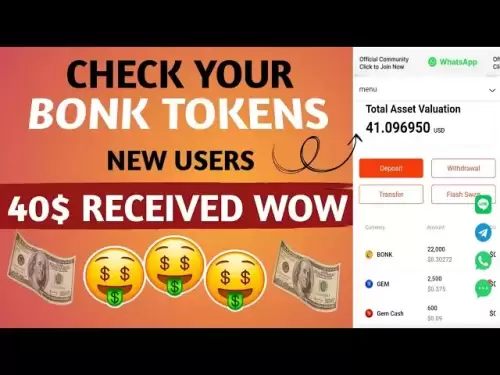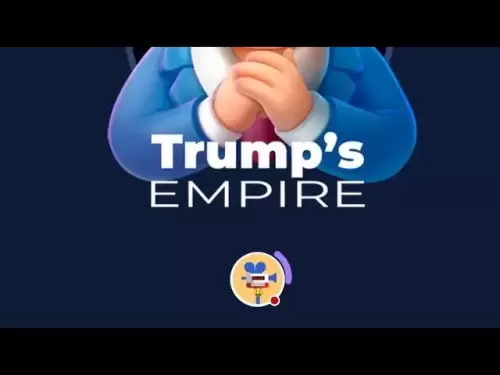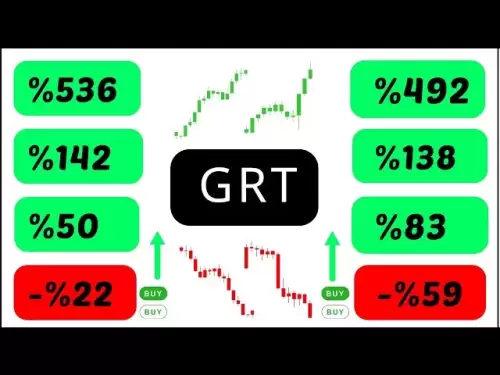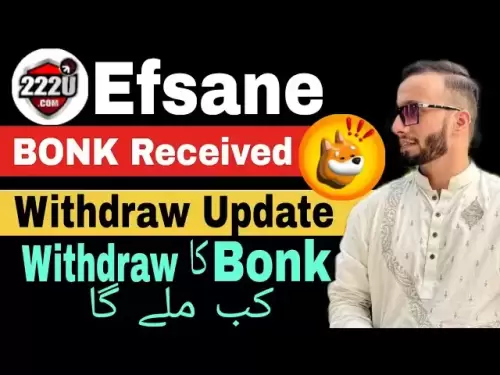-
 Bitcoin
Bitcoin $107,569.2021
1.41% -
 Ethereum
Ethereum $2,430.6950
-0.48% -
 Tether USDt
Tether USDt $1.0005
-0.01% -
 XRP
XRP $2.1884
-0.91% -
 BNB
BNB $647.4445
0.53% -
 Solana
Solana $144.2325
-0.49% -
 USDC
USDC $1.0000
-0.02% -
 TRON
TRON $0.2731
-0.48% -
 Dogecoin
Dogecoin $0.1658
0.61% -
 Cardano
Cardano $0.5694
-2.94% -
 Hyperliquid
Hyperliquid $37.2814
-0.09% -
 Bitcoin Cash
Bitcoin Cash $487.9461
7.41% -
 Sui
Sui $2.7788
-0.50% -
 Chainlink
Chainlink $13.2000
-1.28% -
 UNUS SED LEO
UNUS SED LEO $8.9994
0.22% -
 Stellar
Stellar $0.2417
-2.68% -
 Avalanche
Avalanche $17.6551
-2.73% -
 Toncoin
Toncoin $2.8498
-1.64% -
 Shiba Inu
Shiba Inu $0.0...01166
0.35% -
 Litecoin
Litecoin $84.6510
-0.54% -
 Hedera
Hedera $0.1507
-2.44% -
 Monero
Monero $315.5116
-0.39% -
 Ethena USDe
Ethena USDe $1.0001
-0.04% -
 Polkadot
Polkadot $3.3900
-1.91% -
 Dai
Dai $0.9999
0.00% -
 Bitget Token
Bitget Token $4.4262
3.03% -
 Pi
Pi $0.6122
12.98% -
 Uniswap
Uniswap $7.0039
-0.60% -
 Pepe
Pepe $0.0...09582
-3.75% -
 Aave
Aave $257.8121
-2.70%
How to buy and sell CRV? What basic steps do novices need to master?
Novices can master buying and selling CRV on Curve Finance by setting up a wallet, choosing an exchange like Uniswap, and following basic transaction steps.
May 06, 2025 at 12:56 pm
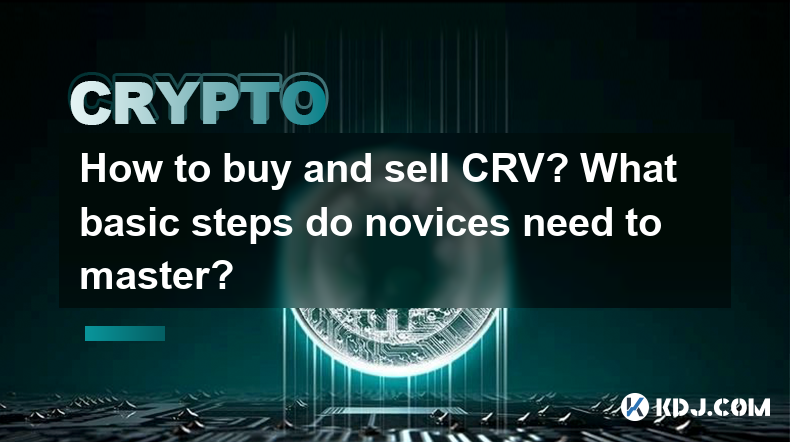
Buying and selling CRV, the native token of the Curve Finance platform, is a process that can be mastered by novices with a clear understanding of the basic steps involved. Curve Finance is a decentralized exchange liquidity pool on Ethereum designed for extremely efficient stablecoin trading. CRV tokens are used for governance and can also be staked to earn rewards. Here's a detailed guide on how to buy and sell CRV, including the essential steps that beginners need to know.
Preparing to Buy CRV
Before you can buy CRV, you need to set up the necessary tools and accounts. The first step is to have a cryptocurrency wallet that supports Ethereum-based tokens. Popular options include MetaMask, Trust Wallet, and Ledger. Once you have a wallet, you need to fund it with Ethereum (ETH) or another cryptocurrency that you can swap for CRV.
- Download and set up your chosen wallet according to the provider's instructions.
- Fund your wallet by transferring ETH or another supported cryptocurrency from an exchange or another wallet.
Choosing an Exchange
To buy CRV, you'll need to use a cryptocurrency exchange that lists it. Some reputable exchanges where you can buy CRV include Uniswap, SushiSwap, and Binance. Each of these platforms has its own user interface and processes, but the general steps remain similar.
- Visit the website of the chosen exchange and connect your wallet.
- Navigate to the trading section and search for the CRV token.
- Select the trading pair you want to use, such as ETH/CRV.
Buying CRV
Once you've chosen an exchange and connected your wallet, you can proceed to buy CRV. The process is straightforward but requires attention to detail to ensure you're getting the best price and avoiding unnecessary fees.
- Enter the amount of ETH (or other cryptocurrency) you want to swap for CRV.
- Review the transaction details, including the amount of CRV you will receive and any associated fees.
- Confirm the transaction using your wallet, which will prompt you to sign the transaction with your private key or password.
- Wait for the transaction to be processed on the blockchain, which can take a few minutes depending on network congestion.
Storing CRV
After purchasing CRV, it's important to store it securely. You can keep your CRV in your wallet, but for added security, you might consider transferring it to a hardware wallet like Ledger or Trezor. These devices store your private keys offline, making them less vulnerable to hacking.
- Transfer CRV to your hardware wallet by following the manufacturer's instructions.
- Regularly check your wallet to ensure your CRV is safe and to monitor any changes in value.
Selling CRV
Selling CRV is similar to buying it, but in reverse. You'll need to use an exchange that supports CRV and follow the platform's process for selling tokens.
- Connect your wallet to the exchange.
- Navigate to the trading section and select the CRV trading pair you want to use.
- Enter the amount of CRV you want to sell and review the transaction details.
- Confirm the transaction using your wallet.
- Wait for the transaction to be processed and the funds to be transferred to your wallet.
Additional Tips for Novices
As a novice, there are a few additional tips you should keep in mind when buying and selling CRV:
- Research the market before making any trades. Understanding the current market conditions and the potential risks involved can help you make more informed decisions.
- Start small to get a feel for the process. As you become more comfortable, you can increase the size of your trades.
- Be aware of fees. Exchanges and wallets often charge fees for transactions, so make sure you understand these costs before proceeding.
- Stay secure. Always use strong passwords, enable two-factor authentication where available, and never share your private keys or seed phrases with anyone.
Frequently Asked Questions
Q: Can I buy CRV directly with fiat currency?
A: Currently, most exchanges do not support direct purchases of CRV with fiat currency. You'll need to buy ETH or another supported cryptocurrency first and then use that to buy CRV.
Q: How do I know if I'm getting a good price for CRV?
A: You can compare prices across different exchanges to see where you can get the best deal. Additionally, tools like CoinGecko and CoinMarketCap provide real-time price data for CRV, which can help you assess its value.
Q: What are the tax implications of buying and selling CRV?
A: The tax implications of buying and selling CRV depend on your country of residence. In many jurisdictions, cryptocurrency transactions are subject to capital gains tax. It's advisable to consult with a tax professional to understand your specific obligations.
Q: Can I stake my CRV to earn rewards?
A: Yes, you can stake your CRV on the Curve Finance platform to participate in governance and earn rewards. Staking involves locking up your CRV tokens for a period of time, and in return, you receive voting rights and a share of the platform's fees.
Disclaimer:info@kdj.com
The information provided is not trading advice. kdj.com does not assume any responsibility for any investments made based on the information provided in this article. Cryptocurrencies are highly volatile and it is highly recommended that you invest with caution after thorough research!
If you believe that the content used on this website infringes your copyright, please contact us immediately (info@kdj.com) and we will delete it promptly.
- Bitcoin, Dogecoin, Ethereum: Decoding the Crypto Buzz
- 2025-06-26 04:25:12
- Jupiter (JUP) Price: Downtrend in Danger? Trend Shift Watch!
- 2025-06-26 04:25:12
- Dogecoin Price Prediction: Crypto Analyst Eyes $1 Target – Is the Meme Coin Ready to Rally?
- 2025-06-26 04:45:12
- Coinbase, Shares, and Stablecoins: Riding the Crypto Wave
- 2025-06-26 04:30:12
- Tether, Bitcoin, and Crypto Funds: A New York Minute on the Latest Moves
- 2025-06-26 05:25:12
- Bitcoin Price: Is a Drop Incoming? Analyzing the Latest Predictions
- 2025-06-26 05:25:12
Related knowledge

How to customize USDT TRC20 mining fees? Flexible adjustment tutorial
Jun 13,2025 at 01:42am
Understanding USDT TRC20 Mining FeesMining fees on the TRON (TRC20) network are essential for processing transactions. Unlike Bitcoin or Ethereum, where miners directly validate transactions, TRON uses a delegated proof-of-stake (DPoS) mechanism. However, users still need to pay bandwidth and energy fees, which are collectively referred to as 'mining fe...

USDT TRC20 transaction is stuck? Solution summary
Jun 14,2025 at 11:15pm
Understanding USDT TRC20 TransactionsWhen users mention that a USDT TRC20 transaction is stuck, they typically refer to a situation where the transfer of Tether (USDT) on the TRON blockchain has not been confirmed for an extended period. This issue may arise due to various reasons such as network congestion, insufficient transaction fees, or wallet-rela...

How to cancel USDT TRC20 unconfirmed transactions? Operation guide
Jun 13,2025 at 11:01pm
Understanding USDT TRC20 Unconfirmed TransactionsWhen dealing with USDT TRC20 transactions, it’s crucial to understand what an unconfirmed transaction means. An unconfirmed transaction is one that has been broadcasted to the blockchain network but hasn’t yet been included in a block. This typically occurs due to low transaction fees or network congestio...

How to check USDT TRC20 balance? Introduction to multiple query methods
Jun 21,2025 at 02:42am
Understanding USDT TRC20 and Its ImportanceUSDT (Tether) is one of the most widely used stablecoins in the cryptocurrency market. It exists on multiple blockchain networks, including TRC20, which operates on the Tron (TRX) network. Checking your USDT TRC20 balance accurately is crucial for users who hold or transact with this asset. Whether you're sendi...

What to do if USDT TRC20 transfers are congested? Speed up trading skills
Jun 13,2025 at 09:56am
Understanding USDT TRC20 Transfer CongestionWhen transferring USDT TRC20, users may occasionally experience delays or congestion. This typically occurs due to network overload on the TRON blockchain, which hosts the TRC20 version of Tether. Unlike the ERC20 variant (which runs on Ethereum), TRC20 transactions are generally faster and cheaper, but during...

The relationship between USDT TRC20 and TRON chain: technical background analysis
Jun 12,2025 at 01:28pm
What is USDT TRC20?USDT TRC20 refers to the Tether (USDT) token issued on the TRON blockchain using the TRC-20 standard. Unlike the more commonly known ERC-20 version of USDT (which runs on Ethereum), the TRC-20 variant leverages the TRON network's infrastructure for faster and cheaper transactions. The emergence of this version came as part of Tether’s...

How to customize USDT TRC20 mining fees? Flexible adjustment tutorial
Jun 13,2025 at 01:42am
Understanding USDT TRC20 Mining FeesMining fees on the TRON (TRC20) network are essential for processing transactions. Unlike Bitcoin or Ethereum, where miners directly validate transactions, TRON uses a delegated proof-of-stake (DPoS) mechanism. However, users still need to pay bandwidth and energy fees, which are collectively referred to as 'mining fe...

USDT TRC20 transaction is stuck? Solution summary
Jun 14,2025 at 11:15pm
Understanding USDT TRC20 TransactionsWhen users mention that a USDT TRC20 transaction is stuck, they typically refer to a situation where the transfer of Tether (USDT) on the TRON blockchain has not been confirmed for an extended period. This issue may arise due to various reasons such as network congestion, insufficient transaction fees, or wallet-rela...

How to cancel USDT TRC20 unconfirmed transactions? Operation guide
Jun 13,2025 at 11:01pm
Understanding USDT TRC20 Unconfirmed TransactionsWhen dealing with USDT TRC20 transactions, it’s crucial to understand what an unconfirmed transaction means. An unconfirmed transaction is one that has been broadcasted to the blockchain network but hasn’t yet been included in a block. This typically occurs due to low transaction fees or network congestio...

How to check USDT TRC20 balance? Introduction to multiple query methods
Jun 21,2025 at 02:42am
Understanding USDT TRC20 and Its ImportanceUSDT (Tether) is one of the most widely used stablecoins in the cryptocurrency market. It exists on multiple blockchain networks, including TRC20, which operates on the Tron (TRX) network. Checking your USDT TRC20 balance accurately is crucial for users who hold or transact with this asset. Whether you're sendi...

What to do if USDT TRC20 transfers are congested? Speed up trading skills
Jun 13,2025 at 09:56am
Understanding USDT TRC20 Transfer CongestionWhen transferring USDT TRC20, users may occasionally experience delays or congestion. This typically occurs due to network overload on the TRON blockchain, which hosts the TRC20 version of Tether. Unlike the ERC20 variant (which runs on Ethereum), TRC20 transactions are generally faster and cheaper, but during...

The relationship between USDT TRC20 and TRON chain: technical background analysis
Jun 12,2025 at 01:28pm
What is USDT TRC20?USDT TRC20 refers to the Tether (USDT) token issued on the TRON blockchain using the TRC-20 standard. Unlike the more commonly known ERC-20 version of USDT (which runs on Ethereum), the TRC-20 variant leverages the TRON network's infrastructure for faster and cheaper transactions. The emergence of this version came as part of Tether’s...
See all articles




















